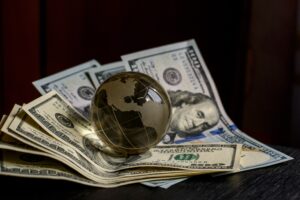In the dynamic world of currency trading, no factor carries as much power as global events. A breaking news story, an unexpected government decision, or even a subtle shift in diplomatic relations can move the forex market within seconds. Traders around the world are constantly adjusting their strategies in response to economic updates and geopolitical signals. This connection between global events and forex is not a trend. It is the foundation of modern currency trading.
The phrase Global Events Forex is not just a search term. It is a reality that shapes how currencies rise and fall, how traders place their bets, and how professional managers protect capital. In this guide, you will learn how global events drive currency movements, how professionals manage these changes, and how you can build a strategy to stay profitable even during uncertainty.
Why Global Events Matter in Forex Trading
Currencies are not just numbers on a screen. They represent the economic health and political stability of entire countries. Every time there is a shift in leadership, a war, a natural disaster, or even a positive trade agreement, the market takes note. The reaction is swift and sometimes extreme. This is why understanding the global events-FX relationship is crucial for both retail traders and institutional players.
Let us take a real-world example. When Russia launched military operations in Ukraine, markets around the world responded immediately. The euro weakened, the US dollar and Swiss franc surged, and oil prices jumped. These reactions were not based on guesswork. Investors moved capital based on fear, uncertainty, and the expectation of further disruptions. This is what makes forex so sensitive to news.
Traders who understand the significance of global headlines can position themselves correctly. Those who ignore this factor often find themselves on the wrong side of the trade. As we explore deeper, you will see why tracking global news is a core part of any solid trading strategy.
Understanding Forex News Impact
Consider the case of January 2023, when the US Consumer Price Index (CPI) data came in lower than expected. Traders immediately interpreted this as a signal that inflation was cooling, which reduced the chances of aggressive rate hikes by the Federal Reserve. As a result, the US dollar weakened sharply, while riskier currencies like the Australian dollar gained ground. This is a perfect example of how even a single data point can influence market direction within minutes.
In addition to geopolitical events, forex markets respond heavily to scheduled economic releases. These are events that follow a calendar and include key reports like employment numbers, inflation data, interest rate decisions, and gross domestic product updates. The Forex news impact is particularly strong when these reports beat or miss expectations.
Take the United States Non-Farm Payroll report. Released monthly, it is one of the most watched events in the forex calendar. If job growth exceeds forecasts, it usually signals a strong economy, boosting the US dollar. On the other hand, weak job numbers can lead to a sell-off in the dollar.
The same is true for central bank meetings. The US Federal Reserve, the European Central Bank, and the Bank of England all issue statements that outline future monetary policy. These statements influence how investors view interest rates, which in turn affect currency valuations. In cases where banks are more hawkish or dovish than expected, the market reacts sharply.
Professional traders prepare for these events with a structured approach. They review past data, monitor analyst expectations, and adjust positions accordingly. Some even avoid trading during the news release window due to high market volatility and forex conditions. These events offer opportunities but also come with risks. Understanding how news moves markets is a valuable skill that improves with experience.
Geopolitical Forex Risks: The Unpredictable Factor
Unlike economic reports, geopolitical developments are harder to predict and control. These include elections, international conflicts, trade wars, government instability, and even terrorism. These are known as geopolitical Forex risks, and they can shake up markets overnight.
One of the most dramatic examples of geopolitical risk was the Brexit vote in 2016. When the United Kingdom voted to leave the European Union, the British pound lost nearly ten per cent of its value in just a few hours. The market did not wait for policy details. The vote itself was enough to trigger massive shifts.
More recently, the US-China trade tensions provided another case study. Whenever new tariffs were announced or trade talks resumed, currency markets responded. The Chinese yuan often depreciated during escalations and recovered when negotiations resumed. This back-and-forth created a wave of volatility that traders could either ride or be caught off guard by.
To manage these risks, experienced traders build defensive strategies. They limit exposure to politically unstable regions, trade safer currency pairs, and diversify their portfolios. Many also use correlated assets like gold or US bonds to hedge against unpredictable shocks. Having a well-defined forex manager strategy is critical during such events.
Market Volatility Forex: Friend or Foe
Volatility is the degree to which a currency pair moves within a given timeframe. In the forex world, volatility is both an opportunity and a challenge. Global events almost always lead to higher volatility. Sometimes it lasts for hours, other times for days or even weeks.
Let us say the European Central Bank unexpectedly cuts interest rates. This would likely cause the euro to drop rapidly against other currencies. Traders who are positioned correctly could make significant gains. However, those on the wrong side could suffer heavy losses if they lack risk controls.
Market volatility in forex can be managed through proper planning. Traders often adjust position sizes, widen stop-loss margins, and avoid overleveraging during uncertain times. They also monitor liquidity. During major events, spreads can widen and execution may suffer. All these factors need to be considered when volatility spikes.
For managed forex accounts, controlling volatility is a major part of the service. Account managers monitor global developments and react in real time. They apply strategies that reduce exposure during chaos and look for opportunities once the market stabilises. Their ability to handle volatility is often what sets them apart from retail traders.
Forex Manager Strategy: Risk Meets Discipline
Managed forex accounts offer an edge for investors who want exposure to currency markets without trading themselves. The professionals behind these accounts use specific systems and frameworks to guide decisions. A key element is how they adapt to global news.
During the COVID-19 pandemic, forex markets experienced wild swings. The US dollar gained strength initially as a global safe haven. Then, as the Federal Reserve slashed interest rates and introduced stimulus, the dollar weakened. Emerging markets and commodity currencies were highly volatile.
A seasoned forex manager would have taken the following steps. First, reduce exposure to high-risk currencies like the Brazilian real or South African rand. Second, increase allocations to safer assets like the Japanese yen or Swiss franc. Third, maintain high cash levels to enter positions at better prices.
This is not guesswork. It is a disciplined forex manager strategy built on research, risk control, and rapid response. These professionals also use tools like sentiment analysis, volatility forecasting, and macroeconomic modelling to guide decisions. Their approach is structured, not emotional.
Long-Term Trends Following Global Events
A fitting example of a long-term shift is Japan’s economic trajectory post-2011 earthquake and nuclear crisis. In the years that followed, Japan faced economic stagnation, prompting aggressive monetary easing by the Bank of Japan. The yen weakened substantially, boosting exports and reshaping its position in global currency rankings. This shows how natural disasters and the policy responses that follow can lead to multi-year trends in forex markets.
Global events do not always trigger short-term disruptions. They often shape long-term currency trends. For example, after the global financial crisis in 2008, interest rates in developed countries stayed near zero for years. This suppressed the value of many currencies and pushed investors to search for yield elsewhere.
The COVID-19 pandemic, similarly, initiated a long-term change in how central banks respond to economic shocks. The rise of digital currencies and growing fiscal deficits are also long-term factors that influence currency strength.
Traders and managers alike must look beyond daily charts. Understanding the potential for multi-year shifts in global trade, policy, and technology will help you navigate the future of forex more confidently.
Psychological Impact of Global Market Moves
When trading during global events, psychology plays a crucial role. News-driven volatility often leads to emotional decisions. Fear of missing out, panic selling, or overconfidence after a lucky win can all cloud judgement.
To manage this, traders must stick to their strategy and maintain emotional control. Keeping a trading journal, practising mindfulness, or even taking breaks from the market can restore clarity. Professional managers often work in teams, which reduces individual emotional bias.
Understanding how your brain reacts to uncertainty can be just as important as your trading system. The best traders master their emotions before they master the market.
Final Thoughts
Global events are not interruptions to the forex market. They are the very fuel that drives it. Every conflict, announcement, policy change, or unexpected disaster offers both risk and reward. Traders who succeed are not those who guess correctly every time. They are the ones who remain disciplined, informed, and adaptable.
You now understand how events impact currencies, what strategies professional managers use, and how to prepare for unexpected shifts. Whether you choose to manage your own trades or invest in a managed account, the key lies in understanding the global events’ forex dynamic.
Forex trading is not just about numbers or charts. It is about people, politics, and the ever-changing world we live in. Your trading results will reflect how well you stay in tune with that world.
Read here to learn more about Forex Managed Accounts vs ETFs: Which One Works Better?

I’m Chaitali Sethi, a financial writer and market strategist focused on Forex trading, market behaviour, and trader psychology. I simplify complex market movements into clear, practical insights that help traders make better decisions and build a stronger trading mindset.




